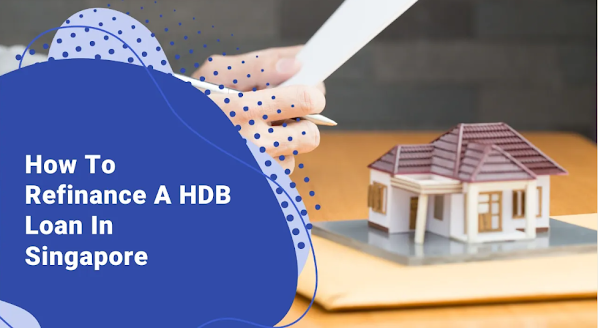Refinancing Your HDB Loan: A Complete Step-by-Step Guide
Navigating the process of refinancing an HDB loan in Singapore may appear daunting at first, especially for those not versed with the nuances of mortgage management. This guide aims to demystify the process of refinancing HDB home loans in Singapore, shedding light on what refinancing entails and the considerable benefits it can offer. For homeowners considering the move to refinance HDB loan options, making well-informed decisions is key.
What is Refinancing?
In the context of HDB loans in Singapore, refinancing involves replacing your existing mortgage with a new one, potentially under more advantageous terms. Homeowners may choose to refinance from HDB loan to bank loan to capitalise on lower interest rates, reduce their monthly repayments, or transition from a less flexible HDB loan to a more adaptable bank loan.
Key Considerations Before Refinancing
Embarking on the journey to refinance your HDB loan requires you to consider several factors:
- Current Interest Rates: Evaluate how the prevailing rates compare to those of your current loan.
- Financial Goals: Identify what you hope to achieve by refinancing HDB home loan in Singapore.
- Remaining Loan Tenure: Assess the duration left on your current loan.
- Costs Involved: Determine if the potential savings justify the costs of refinancing.
Step-by-Step Guide to Refinancing Your HDB Loan
- Assessing Your Eligibility
Eligibility criteria to refinance HDB loan options include a solid credit score, compliance with the Total Debt Servicing Ratio (TDSR), and lender-specific requirements.
- Comparing HDB and Bank Loans
When considering refinance from HDB loan to bank loan, understanding the differences is essential. Bank loans often provide lower interest rates and greater flexibility but come with distinct terms.
- Understanding the Costs Involved
The process to refinance HDB loans is not without expense. Anticipated costs involve legal fees, valuation fees, and potential penalties for early repayment.
- Choosing a Financial Institution
Opt for a bank that presents competitive rates and terms that align with your refinancing goals. Thoroughly compare loan offers from different institutions.
- Application Process
This step requires assembling necessary documents and submitting your application for a refinanced loan, whether online or in person.
- Finalising Your Refinance
Completing your refinance involves signing the new loan agreement and effectively managing the switch between your old and new loan accounts.
Benefits of Refinancing From HDB Loan to Bank Loan
Refinancing from an HDB loan to a bank loan in Singapore presents notable benefits, chiefly the opportunity for lower interest rates, which can translate into significant savings across the loan's lifespan. Such savings afford homeowners the flexibility to invest, save, or expedite their mortgage payoff.
Bank loans also offer enhanced flexibility with loan tenures, allowing homeowners to adjust their repayment terms to align with their financial goals, be it through extending the tenure for more manageable monthly payments or shortening it to minimise interest costs. This adaptability facilitates improved financial planning and management.
Additionally, transitioning to a bank loan grants access to a range of financial planning tools and services, enabling more efficient management of personal finances, investment opportunities, and the strategic use of property equity. Overall, refinancing to a bank loan not only promises cost savings but also equips homeowners with the tools to optimise their financial strategy.
Potential Drawbacks
Despite its benefits, refinancing HDB home loan Singapore options can introduce challenges. Initially, the process may incur costs such as application fees, legal fees, and valuation fees, which can add up and offset the savings gained from lower interest rates. Additionally, if the refinanced loan has a longer tenure, you might end up paying more in interest over the life of the loan despite lower monthly payments. Refinancing can also lead to a loss of benefits tied to your original loan, such as subsidies or fixed rates for a certain period. Moreover, fluctuating interest rates with new loans could increase unpredictably of future payments, affecting your long-term financial planning.Refinancing a HDB loan to a bank loan has become an increasingly popular option among Singaporean homeowners.Understand how refinancing a HDB loan to a bank loan works and why it is a strategic decision that can lead to considerable savings over time. Understand how refinancing a HDB loan to a bank loan works and why it is a strategic decision that can lead to considerable savings over time.
Additionally, bank loans offer more flexible loan terms. Homeowners can choose between fixed-rate loans, which provide stability in repayments for a period, and floating-rate loans, which can offer relatively lower rates depending on market conditions. This flexibility allows homeowners to tailor their loans to fit their financial situations and goals more closely
Conclusion
The decision to refinance your HDB loan in Singapore holds substantial benefits but requires a clear understanding of your financial circumstances and objectives. Engaging with financial advisors or banks for bespoke advice is highly recommended.
FAQs
Q: Will refinancing my HDB loan always save me money?
A: Not always. Savings depend on the current interest rates, new loan terms, and the costs associated with refinancing.
Q: Can I switch back to an HDB loan after refinancing with a bank?
A: No, once you've refinanced your HDB housing loan with a bank, it's not possible to revert back to an HDB loan. Nevertheless, you have the option to reprice your current bank housing loan with the same financial institution to possibly achieve lower interest rates.
Q: How long does the refinancing process take?
A: The timeframe can vary from a few weeks to months, influenced by the lender's efficiency and the completeness of your documentation.



Comments
Post a Comment